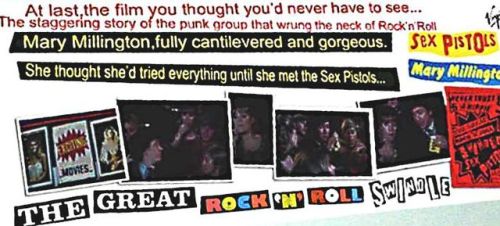Mary Millington
9-video playlist
THE GREAT ROCK 'N' ROLL SWINDLE
Medley
Anarchy in the U.K.God Save the QueenPretty VacantNo One is Innocentdalla colonna sonora del film di Malcom McLaren

Sex and Fame: The Mary Millington Story (October 12th 1996, Channel 4)

Mary Millington
9-video playlist
1
Mary Millington
A scene from vintage 1979 sex film Queen of the blues, one of her last films before her suicide, 19.8.79, aged 33
2
Mary Talks Dirty
A cocaine habit paid for and sponsored by David Sullivan...who's flithy rag 'Whitehouse' would endlessley feature her spread legged and doped. Prior to meeting him, Mary or Ruth as I knew her, was a charming, pretty and above all honest girl, who got sucked into a nest of avaricious vipers...who now run football clubs! Mary was worth more than all your snorts put together... you'll reap what you raped and long may you prosper...for sure as hell I wouldn't want to meet Mary in Heaven!
3
Here Come The Buts
Mary Millington 7"
1980
Bass -- Geoff Dodimead, Guitar -- Mark Sutherland Guitar, Vocals -- Andy Ross Vocals, Percussion -- Dave Henderson In 1979 they released two 7 inches. First was The Invisible E.P. and then Drums Over London.
Their third and final release was Here Comes The Buts 7" in 1980. Here Comes The Buts was featured on "British Underground - The Best of the UK Punk New Wave, 1977 - 1982 - Vol.2" from Chaos Wreckords.
4
Join Diana Dors, adult superstar Mary Millington, Willie Rushton, Françoise Pascal, Aimi MacDonald and erstwhile Artful Dodger, Jack Wild for a very Seventies period sex-comedy.
Lampooning Upstairs Downstairs, KEEP IT UP DOWNSTAIRS sees a host of stars shedding their Edwardian costumes to save the family silver!
5
A selection of original movie posters from some of the films of the British Sexploitation star Mary Millington
6
Alongside Come Play with Me and Confessions of a Window Cleaner, Eskimo Nell takes its place
7
"In the 1970s one girl broke all the rules."
Teaser trailer for Respectable: The Mary Millington Story, due for release in 2016.
Mary became the most successful British model of the 1970s, whose racy reputation could shift a million glamour magazines a month.
She also starred in the longest-running British movie of all-time, 'Come Play with Me,' released in 1977, and still playing in London’s West End four years later.
Tragically, she died, aged 33, August 1979.
8
Directed by Julien Temple
Filmography
The Great Rock 'n' Roll Swindle
Mary, The Crook's girlfriend1979 Queen of the Blues
Mary, Queen of the Blues1979 Confessions from the David Galaxy Affair
Millie1978 The Playbirds
Lucy1978 What's Up Superdoc!
Champagne Girl1977 Come Play with Me
Sue1976 Keep It Up Downstairs
Polly1976 Intimate Games
Choir Girl (uncredited)1976 I'm Not Feeling Myself Tonight
Girl in Sunglasses (uncredited)1976 Liz
Erik's girlfriend (as Mary Maxted)1975 Adam and Nicole
Jane (as Mary Maxted)1975 Eskimo Nell
Traffic Warden Stripper (uncredited)1974 Sex Is My Business (Short)
1973 Naughty Wives
Traffic Warden (uncredited)1971 Oral Connection (Short)
1971 Special Assignment (Short)
1970 Miss Bohrloch (Short)
Prostitute (uncredited)
Trivia
Subject of the 1980 song
"Mary Millington (You Made Me Fall In Love With You)"
by The Disco Zombies, it appears on their album "Here Come the Butts 7".
Quotes
Blue movies are great, educational and great tension-relievers. We all need horny thrills, right?
I treat sex as something to be enjoyed, something to be savored, something to cling to, something to be indulged in whenever possible. The old slogan "Make love not war" was a very good one.
Queen Of The Blues: Mary Millington’s Confessions
On 19th August 1979, Mary Millington’s lifeless body was discovered by her husband, at her home in Walton-on-the-Hill in Surrey; she had taken an overdose of paracetamol, washed down with a large amount of vodka, a slow and agonising way to die. Four suicide notes were found at the scene, each one documenting their author’s troubled state of mind and explained how she felt that death was her only option.
As the most recognisable adult star in Britain, for the past decade Mary had devoted herself to a tireless campaign for more liberal pornography laws, and for a freer debate on the expression of female sexuality. Even as she lay dying she wrote, ‘I do hope so much porn is legal one day, they called me obscene names for being in possession of it – I can’t go through anymore.’ The prospect of spending time in jail was one that haunted Mary in her final years, and the two London adult shops she owned and often worked in, had been subjected to countless raids. At the time of her death, she was due to appear before the Old Bailey on a recent obscenity charge, and feeling that she was being deliberately persecuted by the authorities, she confessed in one of the notes found beside her, ‘The police have framed me yet again. They frighten me so much. I can’t face the thought of prison.’
Born Mary Ruth Quilter in Kenton, Middlesex on 30th November 1945, Mary shared her birthday with Winston Churchill, something she often remarked upon. Mary’s mother, Joan Quilter, worked for the Foreign Office and her father was the opera critic, John W. Klein; the relationship was a casual one and dissolved soon after Mary was born, with Klein eventually losing contact altogether with both Quilter and his young daughter. A lifelong animal lover, Mary had ambitions to become a veterinary nurse, but was let down by her inability to pass the required exams. Nevertheless, she became an ardent supporter of several animal charities, including the PDSA, and was devoted to her own dogs.
At the age of eighteen, Mary met and married a butcher, Bob Maxted, and moved to Dorking, but was unhappy over her lack of a career. Taking a job as the manager of a fashionable boutique, she also began modelling part-time and in 1970, she met the notorious pornographer John Lindsay. By now separated from her husband, Lindsay managed to persuade to appear in several short pornographic films, known as ‘loops,’ the first of which was Miss Bohrloch. Extremely confident in her body, Mary would feature in around twenty loops in total, bringing her to the attention of pornographers across Europe and winning her unapologetic sexuality a legion of admirers. As Mary freely admitted, ‘From being a kid I have always been something of an exhibitionist, point a camera at me and I was posing madly…with my clothes on of course, it was later when I started to take them off.’
Soon after starring in the 1974 Harrison Marks production, Sex Is My Business, Mary was introduced to David Sullivan, one of the most prolific adult magazine publishers in the country and the two quickly began a relationship. As a marketing ploy for his new protégé Sullivan encouraged Mary to adopt the name Millington in order to claim she was the sister of Whitehouse editor Doreen Millington. Her risqué shoots and uninhibited style meant that Mary soon became a firm favourite with readers of Sullivan’s publications, which included Whitehouse, Playbirds, Ladybirds and Private.
Early on in her career, Mary began working as an escort, which she chose to continue after she had become well-known, even boasting that her high-profile lovers included the then Prime Minister Harold Wilson, as well as the Shah of Iran and actress Diana Dors.
In 1977, Mary featured in the softcore comedy Come Play With Me, produced by her lover Sullivan which saw her acting alongside several famous faces of the British screen, including Alfie Bass and Irene Handl. To garner publicity for the film, Mary and some of her co-stars stood outside 10 Downing Street to pose with a policeman when, in an impromptu move, Mary pulled down her top to reveal her breasts. Although Mary’s role was significantly reduced in the final cut, the film was a huge success and ran at the Moulin Cinema in London from 1977 until 1981. Actress Suzy Mandel later spoke of how she remembered Mary as an outgoing and cheerful girl, who loved listening to the Bee Gees and drinking Campari and lemonade on the film’s set.
The following year, Mary was cast in Sullivan’s next film The Playbirds, about a group of WPCs, ironic given that Mary would come to distrust and dislike the police whom she believed relentlessly hounded her for her lifestyle. Mary’s subsequent adult films like 1979’s Queen of the Blues, proved to be far less popular with viewers, leading Mary to worry that her star and her looks were starting to wane. Her final cinematic appearance was a brief cameo in the Sex Pistols film, The Great Rock ‘n’ Roll Swindle, released in March 1980.
Above: Clip from The Playbirds (1978)
Fear of aging and losing her fame started to eat away at Mary’s earlier confidence. Initially only a casual drug user, she began to rely heavily on cocaine and Mary’s habit spiralled out of control, leaving her finances in disarray and resulting in demands over unpaid taxes. The death of her mother Joan from cancer in 1976 had caused Mary to succumb to bouts of deep depression, which she found increasingly difficult to escape. As a way of coping, Mary turned to shoplifting, often stealing cheap and pointless objects; she was arrested numerous times, the last only days before her suicide.
Calling her publicist John M. East on 18th August 1979, Mary had asked him to sing to her a song she liked, that ended with the word ‘tomorrow.’ East did as she asked, only to have her reply, ‘there will be no tomorrow John,’ before hanging up. For Mary her prediction came true; she was buried alongside her mother at the St Mary Magdalene Church in South Holmwood, Surrey.
In 1980 Sullivan released the film Mary Millington’s True Blue Confessions – a move that was seen by many as a cheap and exploitative stunt. As the new decade progressed, plenty of upcoming young stars had been willing to take Mary’s place and she faded from public memory for all but a small number of dedicated fans. However, books such as Simon Sheridan’s 1999 biography Come Play With Me: The Life and Films of Mary Millington, and the 1996 Channel 4 documentary Sex and Fame: The Mary Millington Story, have brought her to the attention of more modern audiences. With the legalisation of hardcore pornography in Britain in 2000, it would seem that Mary finally got her wish, albeit twenty years too late for her. In our progressively sexualised society, with an abundance of extremely graphic pornographic images readily available online, Mary’s photographs and films appear relatively tame; current as ever though, is her unfaltering belief that ‘The old slogan “Make love not war” was a very good one.’
Selected Sources:
Come Play With Me: The Life and Films of Mary Millington – Simon Sheridan (1999)






